Executive Summary
- Kaiser Permanente and NUHW reached a tentative agreement, ending a six-month strike by approximately 2,400 mental health workers in Southern California.
- The agreement addresses key issues such as increased wages, more time for patient care, and the restoration of pensions.
- California lawmakers have expressed concerns about Kaiser's mental health services, with the company facing scrutiny for alleged violations of state laws.
Event Overview
A six-month strike involving approximately 2,400 Kaiser Permanente mental health workers in Southern California has concluded with a tentative agreement between Kaiser and the National Union of Healthcare Workers (NUHW). The strike, which began in late October 2024, centered on issues such as increased wages, more time for mental health workers to dedicate to patient care, and the restoration of pensions. The agreement awaits ratification by union members, expected by Thursday, and has involved mediation efforts and attention from state lawmakers concerned about Kaiser's mental health services.
Media Coverage Comparison
| Source | Key Angle / Focus | Unique Details Mentioned | Tone |
|---|---|---|---|
| Robert Garrova/LAist | End of Kaiser behavioral health workers' strike | The strike involved over 100 workers picketing Kaiser Hollywood in February; Demonstrators were arrested and mental health workers participated in a hunger strike; The National Union of Healthcare Workers claims it is the longest strike of mental health workers in U.S. history. | Informative |
| cbs8.com | Tentative agreement reached between Kaiser and NUHW | Approximately 2,400 mental health workers in Southern California went on strike; The previous contract expired September 30; Mark Ghaly, MD, and Darrell Steinberg were thanked for their support during negotiations. | Neutral |
| CalMatters | Lawmakers scrutinizing Kaiser Permanente's mental health services | Kaiser declined to attend an informational hearing about its behavioral health services; Kaiser cited concerns about the involvement of the National Union of Healthcare Workers; Kaiser claims to have invested over $1 billion in improving behavioral health care since 2020. | Critical |
Key Details & Data Points
- What: A tentative agreement was reached between Kaiser Permanente and the NUHW, ending a six-month strike by mental health workers.
- Who: Key actors include Kaiser Permanente, the National Union of Healthcare Workers (NUHW), striking mental health workers, California lawmakers (Mia Bonta, Celeste Rodriguez), Mark Ghaly, Darrell Steinberg, Kaiser spokesperson Terry Kanakri, and Kaiser Vice President Simon Borger.
- When: The strike began in late October 2024 and ended with a tentative agreement announced on May 4, 2025. The contract ratification vote is expected by Thursday.
- Where: The events primarily occurred in Southern California, with legislative hearings taking place in Sacramento.
Key Statistics:
- Key statistic 1: 2,400 (approximate number of Kaiser mental health workers on strike)
- Key statistic 2: $200 million (settlement agreement between Kaiser and the Department of Managed Health Care in 2023)
- Key statistic 3: $1 billion (Kaiser's investment in improving behavioral health care since 2020, according to the company)
Analysis & Context
The end of the Kaiser Permanente strike marks a significant development in the ongoing dispute between the health organization and its mental health workers. The agreement addresses key concerns raised by the union, including wages, patient care time, and pensions. However, the strike also highlighted broader issues related to Kaiser's mental health services, prompting scrutiny from California lawmakers and raising questions about the quality and accessibility of care. Kaiser's absence from a legislative hearing on the matter further fueled concerns, despite the company's claims of significant investment in improving behavioral health care. The ratification of the agreement is a crucial next step, but the underlying issues related to mental health care at Kaiser likely require continued attention.
Notable Quotes
I have to say, I’m supremely disappointed.
We did not attend the committee’s informational hearing on Kaiser Permanente’s behavioral health care system because we believe it would not have been a productive or balanced discussion.
All around the state, we’ve heard the same refrain from Kaiser plan members. If you break your arm, if you have diabetes, you’ll get great care. But if you have depression or anxiety, don’t count on getting any help.
Conclusion
The tentative agreement between Kaiser Permanente and the NUHW brings an end to a prolonged strike by mental health workers, addressing immediate concerns related to wages, benefits, and working conditions. However, the event underscores persistent issues surrounding Kaiser's mental health services, which have drawn scrutiny from state lawmakers and raised questions about accessibility and quality of care. While the agreement marks a positive step, ongoing monitoring and oversight are needed to ensure that Kaiser meets its obligations to provide adequate mental health services to its members. The upcoming vote on the agreement will be a key indicator of the union's acceptance of the terms and the potential for long-term resolution.
Disclaimer: This article was generated by an AI system that synthesizes information from multiple news sources. While efforts are made to ensure accuracy and objectivity, reporting nuances, potential biases, or errors from original sources may be reflected. The information presented here is for informational purposes and should be verified with primary sources, especially for critical decisions.









